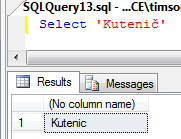”“x10D”转换为“c”通过 SQL Server 2008 查询时
当选择/插入到我的 SQL Server 2008 数据库中时,正在转换中欧字符。
例如:
Select 'Kutenič'
返回:
Kutenic

这是为什么?我怎样才能防止这种情况发生?我的 ASP.NET Web 应用程序也会遇到类似的问题吗?
When Selecting/Inserting into my SQL Server 2008 database, Central European characters are being converted.
For example:
Select 'Kutenič'
Returns:
Kutenic

Why is this? And how can I prevent this from happening? Would my ASP.NET Web Application have a similar problem?
如果你对这篇内容有疑问,欢迎到本站社区发帖提问 参与讨论,获取更多帮助,或者扫码二维码加入 Web 技术交流群。

绑定邮箱获取回复消息
由于您还没有绑定你的真实邮箱,如果其他用户或者作者回复了您的评论,将不能在第一时间通知您!

发布评论
评论(2)
使用
N前缀如果没有它,字符串将被转换为数据库默认排序规则的代码页。
或者,如果更适合您的区域设置,则将数据库的默认排序规则设置为以下之一。
Use the
NprefixWithout it the string will be cast to the code page of your database's default collation.
Or set your database's default collation to one of the following if that is more appropriate for your locale.
几年前我也有同样的问题需要解决。我只记得我们寻找解决方案所遵循的两条路线是:
I had the same issue to solve a few years ago. I just remember that the two tracks we followed to find the solution were: